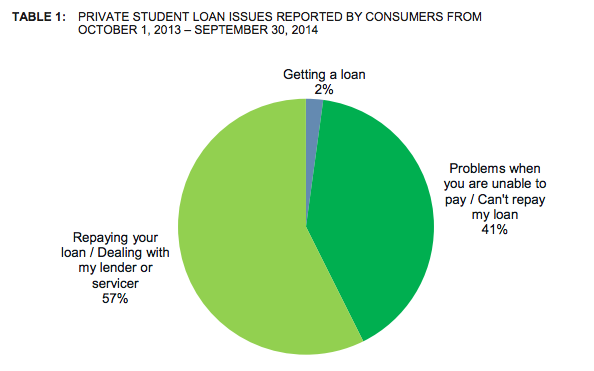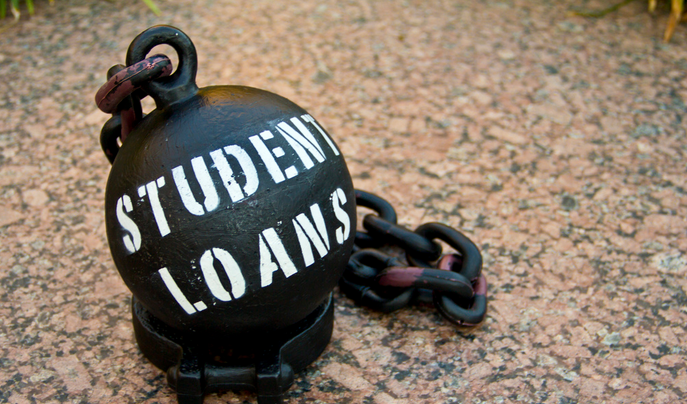CFPB: Private Student Loan Companies Provide Few Options For Borrower, Driving Them To Default
The new report [PDF], which analyzed 5,300 private student loan complaints over the past year, reiterated previous assumptions that private student lenders are not doing enough to help struggling consumers repay their loan obligations and avoid default.
The report highlights borrowers’ helpless in the face of evasive practices perpetrated by many private student loan lenders.

A vast majority of complaints received by the CFPB relating to private student loans involve issues with repayment and servicing of loans.
Many borrowers reported proactively contacting lenders seeking to modify repayment terms to obtain a payment they can actually afford only to be met with rejection and refusals to provide assistance.
However, some borrowers reported that when they did receive information about repayment options they were often given the runaround by customer service representatives who provided conflicting or inaccurate information.
“I have a private consolidation loan through [specialty student loan company]. . . I called . . . to see what options I had regarding delaying the payment on the loan. The customer service agent . . . told me I could put the loan into a forbearance for 3 months,” one borrower reported to the CFPB. “She gave me a confirmation number . . . and told me that I would not have a payment due until [date]. Around [date], I received an email from [specialty student loan company] saying my private loan was past due, even though I thought it was in forbearance. I called [specialty student loan company] on 4 separate occasions over the following days. Today, I finally got through to collections, and they told me that I am not eligible for a forbearance, and that “their employee made a mistake.” I told them repeatedly that I had a confirmation number and that the payment I made for the forbearance was deducted from my checking count. I told the representative that I did nothing in error, and I thought they should honor the forbearance.”
Officials with the CFPB found that this issue was a result of a lack of transparency and communication between lenders and companies hired to collect payments.
When consumers were successful in receiving payment relief options, they quickly found those measures only worked to delay their inevitable loan default.
Although private student loans do not come with the same repayment plans afforded to federal student loans, many lenders may offer borrowers’ temporary forbearance.
The short-term fix, which provides a brief period of time when no payment is due, often does little to actually provide relief to borrowers. In fact, many consumers reported encountering burdensome enrollment fees and processing delays that sometimes led to surprise defaults.
“I was told that I was eligible for a forbearance, however . . . [specialty student loan company] continues to tell me it is “processing” the forbearance,” one complainant tells the CFPB. “I have called in numerous times and even escalated the situation to speaking with a manager last when I was told the matter would be taken care of within 3 to 5 business days which have again passed and my account still shows as past due.”
Officials with the CFPB say these shortcomings reflect an industry that has done little to make good on commitments by lenders to expand alternative repayment options.
“The response by the private student loan industry to distressed borrowers is failing to help them avoid default,” Rohit Chopra, CFPB student loan ombudsman says in the report. “Too many borrowers are barely treading water, losing hope that these companies will throw them a lifeline.”
Because there are few alternatives for private borrowers, many reported that the lack of assistance from lenders resulted in the consumer being driven to default.
In some cases when a borrower defaults, the entire balance of their loan becomes due in full. In that situation, many consumers are unable to pay and their credit profile is affected, making it difficult to pass background checks, obtain housing or access other forms of credit.
While the private student loan complaints received in the past year reflect a 38% increase from the previous year, officials with the CFPB believe the complaint process will ultimately led to significant changes within the lending industry.
In fact, the CFPB report recommends several possible ways in which private student loan borrowers could receive relief.
One recommendation suggests that Congress take action to fix the bankruptcy code to enable distressed borrowers to discharge their student debts.
Back in 2005, a change to bankruptcy laws made it difficult for borrowers to discharge private student loans. It’s those changes that officials with the CFPB suggest may lead lenders to forego working with borrowers on repayments.
Rather than allow all consumers to discharge private student loans during bankruptcy, the CPFB suggests creating limitations that may ultimately lead lenders to provide more flexible payment options.
To achieve that, Chopra suggests that borrowers be allowed to discharge private student loans only in cases where lenders didn’t offer consumers flexible repayment options.
While such significant changes aren’t likely to happen overnight, the CFPB does provide several resources for borrowers struggling to work with their lenders.
Want more consumer news? Visit our parent organization, Consumer Reports, for the latest on scams, recalls, and other consumer issues.


